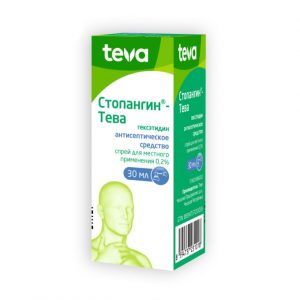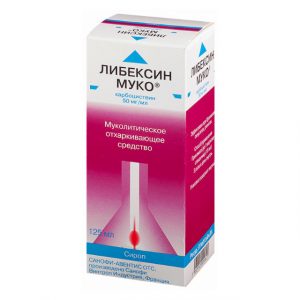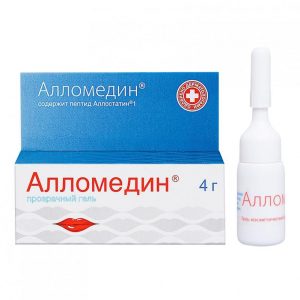Description
The antiviral effect of the antiviral drug hepatitis B (HBV).
Entecavir phosphorylates to form active triphosphate having an intracellular half-life of 15 hours. The intracellular concentration of entecavir triphosphate is directly related to the extracellular level of entecavir, and there is no significant accumulation of the drug after the initial plateau level. By competition with a natural substrate, deoxyguanosine triphosphate, entecavir triphosphate inhibits all 3 functional activities of viral polymerase: 1) priming of HBV polymerase, 2) reverse transcription of a negative strand from pregenomic mRNA, and 3) synthesis of a positive HBV DNA strand. Entecavir triphosphate is a weak inhibitor of cellular DNA polymerases , And with Ki 18-40 ОјM. In addition, at high concentrations of entecavir triphosphate and entecavir, no side effects were observed with respect to polymerase and DNA synthesis in mitochondria of HepG2 cells.
Pharmacokinetics
In healthy people, entecavir absorption is rapid, Cmax in plasma is determined after 0.5-1.5 hours. With repeated administration of entecavir at a dose of 0.1 to 1 mg, an increase in Cmax and AUC is proportional to the dose. The equilibrium state is reached after 6-10 days of ingestion 1 time / day, while the plasma concentration increases by about 2 times. Cmax and Cmin in plasma in equilibrium were 4.2 and 0.3 ng / ml, respectively, when taking the drug at a dose of 500 Ојg, 8.2 and 0.5 ng / ml, respectively, when taken at a dose of 1 mg. When ingestion of entecavir at a dose of 500 mcg with food with a high fat content or with a low intake, a minimum delay in absorption was observed (1-1.5 hours when taken with food and 0.75 hours when taken on an empty stomach), a decrease in Cmax by 44-46% and a decrease AUC by 18-20%.
Vd entecavir exceeded the total volume of water in the body, indicating a good penetration of the drug into the tissues. The binding of entecavir to human plasma proteins in vitro is about 13%.
Entecavir is not a substrate, inhibitor, or inducer of isoenzymes of the P450 system. After the administration of labeled 14C-entecavir to humans and rats, oxidized or acetylated metabolites were not detected, and phase II metabolites (glucuronides and sulfates) were determined in small quantities.
After reaching Cmax, the concentration of entecavir in the plasma decreased biexponentially, while T1 / 2 was 128-149 hours. When taken 1 time / day, the concentration (cumulation) of the drug increased by 2 times, that is, the effective T1 / 2 was approximately 24 hours.
Entecavir is excreted mainly by the kidneys, and in the equilibrium state unchanged in the urine, 62-73% of the dose is determined. Renal clearance is dose-independent and ranges from 360 to 471 ml / min, which indicates glomerular filtration and tubular secretion of entecavir.
Indications
Chronic hepatitis B in adults with compensated liver damage and the presence of viral replication, increased serum transaminase activity (ALT or ACT) and histological signs of inflammatory process in the liver and / or fibrosis with decompensated liver damage.
Contraindications
Children and adolescents under 18 years of age are hypersensitive to entecavir.
Special instructions
For treatment with nucleoside analogues, incl. entecavir, in the form of monotherapy and in combination with antiretroviral drugs, cases of lactic acidosis and severe hepatomegaly with steatosis have been described, sometimes leading to the death of the patient.
Symptoms that may indicate the development of lactic acidosis: general fatigue, nausea, vomiting, abdominal pain, sudden weight loss, shortness of breath, shortness of breath, muscle weakness.
Risk factors are female, obesity, prolonged use of nucleoside analogues, hepatomegaly. When these symptoms appear or if laboratory confirmation of lactic acidosis is obtained, treatment with the drug should be discontinued.
Cases of exacerbation of hepatitis after discontinuation of antiviral therapy, including entecavir. Most of these cases went away without treatment. However, severe exacerbations may develop, including fatal. The causal relationship of these exacerbations with the withdrawal of therapy is unknown. After discontinuation of treatment, liver function should be periodically monitored. If necessary, antiviral therapy may be resumed.
It should be borne in mind that when using entecavir in patients with co-infection with HIV who are not receiving antiretroviral therapy, there may be a risk of developing resistant strains of HIV. Entecavir has not been studied for the treatment of HIV infection and is not recommended for such use. unknown. Renal function should be carefully monitored before and during entecavir treatment in patients undergoing liver transplantation and receiving immunosuppressants that may affect renal function, such as cyclosporine and tacrolimus.
Composition
1 tab.
entecavir monohydrate * 1.065 mg
which corresponds to entecavir 1 mg
Excipients: lactose monohydrate ** – 240.935 mg, microcrystalline cellulose – 138 mg, crospovidone – 16 mg, magnesium stearate – 4 mg.
Composition of the film coat: hypromellose 2910 – 9.698 mg, macrogol 6000 – 2.393 mg, titanium dioxide – 2.138 mg, talc – 0.713 mg, iron dye red oxide E172 – 0.045 mg.
* Theoretical value. The actual value of the amount of entecavir used depends on the actual analysis of the active substance (as it is from about 93-94%) and is adjusted by the lactose content of the monohydrate.
** Theoretical value. The actual amount of lactose monohydrate used depends on the actual amount of active ingredient used.
Dosage and administration
Take orally. The dose is 500-1000 mcg 1 time / day. The frequency of administration depends on the degree of impaired renal function, indications of a history of therapy with nulloside drugs, and liver condition.
Side effects of the
From the digestive system: rarely – diarrhea, dyspepsia, nausea, vomiting, possibly – increased transaminase activity.
From the side of the central nervous system: often – headache, rarely fatigue – insomnia, dizziness, drowsiness.
On the part of the immune system: possibly an anaphylactoid reaction.
From the skin and subcutaneous tissue: possibly – alopecia, rash.
On the part of the metabolism: possibly lactic acidosis (general fatigue, nausea, vomiting, abdominal pain, sudden weight loss, shortness of breath, rapid breathing, muscle weakness), especially in patients with decompensated liver damage.
In addition, in patients with decompensated liver damage, the following side effects were additionally noted: often – a decrease in the concentration of bicarbonate in the blood, an increase in ALT activity and a concentration of bilirubin by more than 2 times compared with VGN, an albumin concentration of less than 2.5 g / dl, an increase in lipase activity by more than 3 times compared to normal, platelet concentration below 50 000 / Ојl rarely – renal failure.
Dispensing conditions from
pharmacies Prescription
dosage form
tablets




